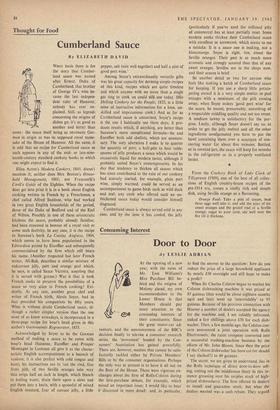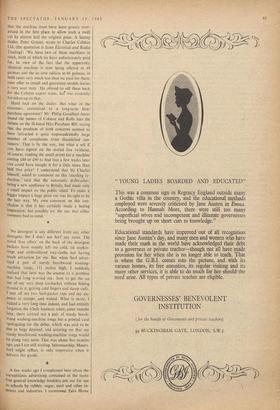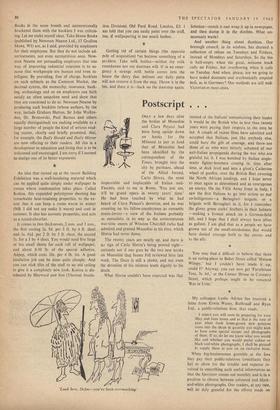Consuming Interest
Door to Door
kIy LESLIE ADRIAN to find the answer to the question : how do you reduce the price of a large household appliance by nearly £50 overnight and still hope to make a profit?
When Sir Charles Colston began to market his Colston dishwashing machine it was priced at 85 guineas (that would be about eighteen months ago) and later went up 'unavoidably' to 95 guineas. Because of his previous connection with Hoover a number of dealers accepted the agency for the machine and, I am reliably informed, staked a few shillings above £70 for each dish- washer. Then, a few months ago, the Colston con- cern announced a joint operation with Rolls Electromatic, the razor company converted into a successful washing-machine business by the efforts of Mr. John Bloom. Since then the price of the Colston dishwasher has been cut (or should I say slashed?) to 49 guineas.
The secret, we are given to understand, lies in the Rolls technique of direct door-to-door sell- ing, cutting out the middleman (busy in this in- stance groaning over his surplus stock of high- priced dishwashers). The firm offered its dealers to install and guarantee stock; but what the dealers wanted was a cash rebate. They argued
that the machine must have been grossly over- priced in the first place to allow such a swift cut by almost half the original price. A Surrey dealer, Peter Granet, wrote.to Charles Colston Ltd. (the quotation is from Electrical and Radio Trading): 'We have two of these machines in stock, both of which we have unfortunately paid for. In view of the fact that the apparently identical machine is now being offered at 49 guineas and the de luxe edition at 66 guineas, in both cases very much less than we paid for them, your offer to install and guarantee models leaves a .very sour taste lie offered to sell them back for .the Colston export trade. bur was evidently apt taken.up on that.
,Hard luck on the dealer. But what of the customer, committed to a long-term hire- purchase agreement? Mr. Philip Goodhart intro- duced the names of Colston and Rolls into the debate on the ill-fated Hire Purchase Bill, saying that the products of both concerns seemed to have '.attracted a quite unprecedentedly large number of complaints from dissatisfied cus- tomers.' That is by the way, but what a sell if You have signed on the dotted line (without, (*course, reading the small print) for a machine costing £80 or i:90 to find that a few weeks later You could have bought it for a little more than half that price! I understand that Sir Charles himself, asked to comment on this 'startling re- duction,' said that the automatic dishwasher, being a new appliance to Britain, had made only a small impact on the public mind. To make a bigger impact a huge price cut was thcught to be the best way. My oWn comment on this con- clusion is that it has certainly made a lasting impression; but possibly no the one that either company had in mind.
No detergent is any different from any other detergent, but I don't use Surf any more. The weird 'free offers' on the back of the detergent packets have usually left me cold, tin napkin- rings and embroidered tray-cloths not having much attraction for me. But when Surf adver- tised a pair of sturdy. beechwood washing- machine tongs, Ill Inches high, 1 suddenly realised that here was the' answer to a problem that had lona orried me: how to get the ice out of my very deep ice-bucket without fishing around in it, getting cold fingers. nd damp cultS. I sent off my two Surf-packet tops and my six- pence in .stamps, and waited. What is more, I Waited a very long time indeed, and had entirely forgotten the whole business when, some months later, there arrived not a pair of sturdy beech- wood washing-machine tongs but a printed card apologising for the delay, which was said to be due to huge demand, and assuring me that my sturdy beechwood washing-machine tongs would be. along very soon. That. was about five months ago, and I am still waiting. Salesmanship, Messrs. Surf might reflect, is only impressive when it delivers the goods.
A few weeks ago I complained here about the surreptitious advertising contained in the many free general knowledge booklets put out for use in schools by rubber, sugar, steel and other in- terests and industries. I mentioned Take Home Books in the same breath and unintentionally bracketed them with the booklets I was criticis- ing. Let me make myself clear. Take Home Books (published by Newman Neame Ltd., 17 Grafton Mews, WI) are, as 1 said, provided by employers for their employees. But they do not include ad- vertisements, not even surreptitious ones. New- man Neame are persuading employers that one way of improving industrial relations is to as- sume that workpeople are human and even in- telligent. By providing, free of charge, booklets on such subjects as the Common Market, the decimal system, the monarchy, insurance, bank- ing, archaeology and so on employers can both satisfy an often unspoken need and show that they are concerned to do so. Newman Neame by producing such booklets (whose authors, by the way, include Graham Hutton, Sir John Wolfen- den, Dr. Bronowski, Paul Bareau and others equally distinguished) are making available to a large number of people the kind of serious read- ing matter, clearly and briefly presented, that, for example, the Daily Herald and Daily Mirror are now offering to their readers. All this is a development in education and living that is to be welcomed and encouraged. I am sorry if I seemed to malign one of its better exponents.
An idea that turned up at the recent Building Exhibition was a wall-insulating material which can be applied quite simply under wallpaper in rooms where condensation takes place. Called Kotina, this expanded polystyrene sheeting has remarkable heat-retaining properties, to the ex- tent that it can keep a room warm in winter (NB. I did not say make it warm) and cool in summer. It also has acoustic properties, and acts as a sound-absorber.
It comes in two thicknesses, 2 nim. and 5 mm., the first costing 2s. 9d. per 3 ft. by 4 ft. sheet and Is. aid. per 2 ft. by 3 ft. sheet, the second 7s. for a 3 by 4 sheet. You would need five large or ten small sheets for each roll of wallpaper, and about 8-10 lb. of the special adhesive, Adpep, which costs 10s. per 4 lb. tin. A good insulation job can be done quite cheaply. And you can stick tiles of the stuff to an old ceiling to give it a completely new look. Kotina is dis- tributed by Hayward and Son ("I hernial Insula-
'Look here, Defoe—you've been overworking.' tion Division), Old Ford Road, London, E3. 1 am told that you can easily paint over the stuff, too, if wallpapering is too much bother.
Getting rid of certain things (the opposite pole of acquisition) has become something of a prcblem. Take milk bottles—neither my milk roundsman nor my dustman will. If in an emer- gency a strange milk bottle comes into the house the dairy that delivers our daily pinta will not remove it from the step. Throw it in the bin, and there it is—back on the doorstep again. Solution—smash it and wrap it up in newspaper, and then dump it in the dustbin. What un- necessary waste!
And another thing about dustbins. Our borough council, in its wisdom, has decreed a collection of refuse on Tuesdays and Fridays, instead of Mondays and Saturdays. So the bin is half-empty when the great, noisome truck calls on Friday, but overflowing when it calls on Tuesday. And when, please, are we going to have sealed dustcarts and mechanically emptied bids, as in Germany? Our methods are still mid- Victorian in most cities.




































 Previous page
Previous page